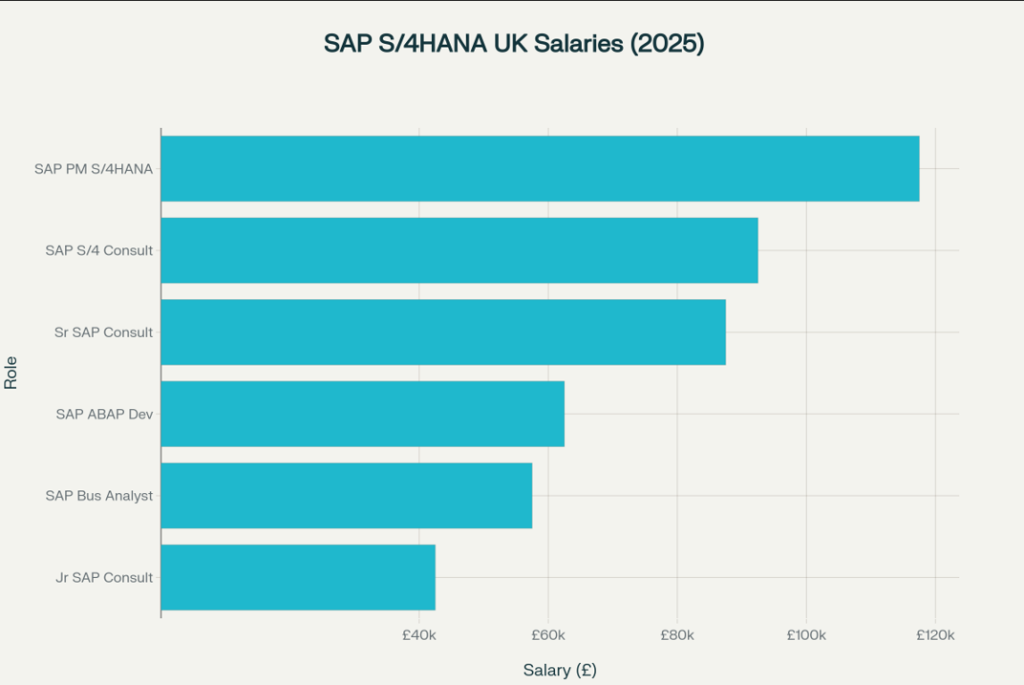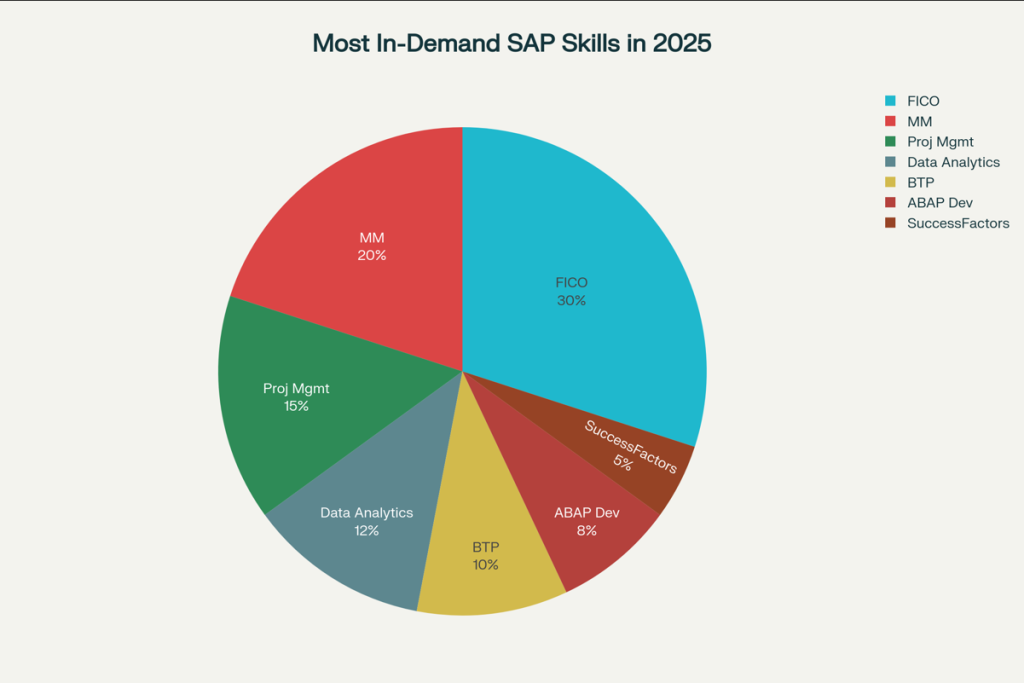SAP S/4HANA Training and Certification: A Strategic Career Investment

Market Dynamics Driving SAP S/4HANA Demand
The SAP S/4HANA certification landscape in 2025 represents one of the most compelling career opportunities in enterprise technology. With the approaching 2027 deadline for SAP ECC support termination and the accelerating pace of digital transformation, certified SAP S/4HANA professionals are experiencing unprecedented demand across global markets. This comprehensive analysis examines how training and certification in SAP S/4HANA can significantly enhance career prospects, earning potential, and long-term professional growth.
The 2027 Migration Imperative
The most significant factor shaping the current SAP job market is the December 31, 2027 deadline for SAP ECC support termination. Approximately 40,000 companies worldwide must migrate to SAP S/4HANA before this deadline, creating what industry experts describe as a “perfect storm” of demand for skilled professionals. This urgent timeline has resulted in 86% of all SAP vacancies in Q4 2024 being S/4HANA-related, with 89% over the last three quarters focused on S/4 programmes.
The migration pressure extends beyond simple system upgrades. Organizations face potential risks including loss of security updates, patches, and customer service support if they fail to transition by the deadline. For companies that delay, SAP offers extended maintenance through 2030, but at a premium cost of 2% above the current 22% support costs, making skilled in-house expertise increasingly valuable.
Skills Shortage and Talent Competition
Europe faces an estimated shortage of around 100,000 SAP consultants to support S/4HANA and cloud migrations. The scarcity is particularly acute in the US, where only 31% of SAP User Group members have implemented S/4HANA, while 63% have yet to initiate migration programmes. The shortage stems from multiple factors including an aging workforce, historical offshoring trends, and the rising complexity of modern SAP implementations.
The competitive landscape has intensified to such a degree that contractors with SAP S/4HANA expertise can command $100 to $200+ per hour, while permanent professionals often field multiple job offers simultaneously. Organizations are responding by treating SAP talent acquisition as a strategic priority, with many engaging specialist recruitment agencies and expanding their benefits packages to attract top talent.

Emerging Certification Areas
The certification landscape is evolving to emphasize cloud technologies, artificial intelligence, and automation. SAP Business Technology Platform (BTP) certifications are gaining prominence as organizations adopt cloud-first strategies. SAP BTP combines data management, analytics, AI, application development, and integration into a unified platform, making certified professionals valuable for digital transformation initiatives.
Career Impact and Salary Advantages
SAP S/4HANA certification delivers substantial salary premiums across all experience levels. In the UK market, the median SAP S/4HANA consultant salary reached £92,500 per year as of August 2025, representing strong year-over-year growth. Career progression opportunities are equally compelling, with senior roles commanding significantly higher compensation.
The salary data reveals clear career advancement pathways, with project managers for large SAP migrations earning over £200,000 in high-demand regions. Contract professionals enjoy even greater earning potential, with experienced consultants commanding premium daily rates that often exceed permanent salary equivalents.
Geographic Opportunities
Certification provides global career mobility, with SAP skills recognized worldwide. Remote work trends have expanded opportunities further, allowing professionals to collaborate with companies across Europe, the US, and other regions without relocation requirements. This geographic flexibility has helped reduce regional salary disparities while expanding access to high-value projects.
The UK market shows particular strength, with growing complexity of SAP implementations increasing demand for specialized knowledge. London and Southeast England offer the highest salaries, often 10-20% above national averages, while other tech hubs including Manchester, Birmingham, and Edinburgh provide competitive compensation packages.
Technical and Functional Expertise

SAP Activate methodology expertise has emerged as a critical differentiator, with organizations adopting this approach for faster, more predictable implementations. Integration architecture skills are equally valuable as companies connect SAP with existing systems and third-party applications.
Business Process Knowledge
Beyond technical skills, employers highly value professionals who understand end-to-end business processes within finance, logistics, manufacturing, and other functional areas. The ability to bridge business requirements with technical solutions distinguishes top candidates in a competitive market.
Sustainability and compliance expertise represent emerging high-value skills, with SAP introducing AI-driven automation and sustainability reporting capabilities. Professionals who master these areas position themselves for premium opportunities as organizations prioritize environmental, social, and governance (ESG) initiatives.
Training Options and Implementation Strategies
Official SAP Training Resources
SAP provides comprehensive learning pathways through SAP Learning Hub, offering premium resources including live sessions, hands-on practice, and four certification exam attempts annually. The platform includes self-paced learning journeys designed by SAP experts, enabling flexible skill development that accommodates working professionals’ schedules.
SAP Learning Class delivers instructor-led courses available onsite or online, providing guided training with direct interaction. These structured programs prepare candidates for certification while building practical skills through real-world scenarios and case studies.
Timeline and Commitment
Dedicated professionals can achieve job-ready status in 4-6 months through structured learning approaches. The typical progression involves three months of foundational learning through SAP Learning Hub and free resources, followed by 2-3 months of certification coursework with hands-on practice. Advanced skills development continues through real-world project experience.
The modular certification structure allows professionals to target specific skills based on career goals and market demand. Micro-certifications focused on specialized skills enable more targeted skill development while reducing time-to-certification for experienced professionals.
Alternative Training Providers
Numerous training organizations supplement official SAP resources with specialized programs. These providers often offer hands-on projects, case studies, and placement assistance, providing comprehensive support for career transitions. Many include resume building, interview preparation, and direct job referrals to enhance employment prospects.
Entry Points and Progression
SAP S/4HANA offers multiple entry points depending on professional background and interests. Four main consultant types provide different career trajectories: Business/Sales Consultants focus on solution selling, Developer Consultants specialize in ABAP and technical development, SAP Basis Consultants handle system administration and security, and Functional Consultants bridge business needs with SAP solutions.
Career progression follows predictable patterns, with entry-level positions leading to mid-level specialist roles and ultimately senior architect or management positions. Certification significantly accelerates this progression, with certified professionals often advancing faster than their non-certified counterparts.
Future-Proofing Strategies
The SAP ecosystem continues evolving toward cloud-native architectures, AI integration, and intelligent automation. Professionals who combine S/4HANA expertise with cloud technologies, data analytics, and emerging SAP innovations position themselves for long-term career success.
Continuous learning requirements built into modern certifications ensure professionals stay current with technological advances. This mandate supports career longevity while maintaining professional relevance in a rapidly changing technology landscape.
UK Market Dynamics
The UK SAP market demonstrates strong demand for S/4HANA skills, with specific emphasis on finance, logistics, technical capabilities, and data migration expertise. Economic uncertainties have led to strategic hiring practices focused on critical roles while maintaining cost optimization priorities.
Contract roles favor project-driven approaches to meet immediate SAP implementation needs without long-term organizational commitments. This trend provides opportunities for experienced consultants to engage in diverse projects while commanding premium rates.
European Trends
Continental European markets face similar skill shortages, with Germany particularly exposed due to large ECC installations and retiring senior consultants. The combination of demographic trends, including aging populations and low birth rates, exacerbates the talent shortage across the region.
Multi-cloud deployment capabilities provide additional opportunities as organizations adopt hybrid cloud strategies spanning AWS, Microsoft Azure, Google Cloud, and SAP Cloud platforms. Professionals with expertise across multiple cloud environments command premium compensation.
Quantifiable Benefits
SAP certification delivers measurable career benefits beyond salary increases. Certified professionals report improved job security, enhanced promotion prospects, and greater project responsibility. The global recognition of SAP certifications provides international career mobility that few other enterprise technology certifications match.
Industry demand continues growing, with digital transformation spending forecast to reach $3.4 trillion by 2026, representing an 89% increase from 2022 levels. This sustained investment ensures continued demand for SAP expertise across multiple industry verticals.
Cost-Benefit Considerations
While certification requires upfront investment in training and examination fees, the return on investment typically materializes within 6-12 months through salary increases and enhanced job opportunities. Many employers support certification costs through professional development programs, further improving the cost-benefit ratio.
Conclusion
SAP S/4HANA training and certification represent strategic career investments in the current job market environment. The convergence of urgent migration deadlines, significant skill shortages, and accelerating digital transformation creates unprecedented opportunities for certified professionals. Salary premiums of 20-30% above non-certified peers, combined with enhanced job security and global mobility, provide compelling returns on certification investment.
The most successful candidates combine technical SAP expertise with business process knowledge, cloud technologies, and emerging capabilities in AI and data analytics. Those who pursue certification now, while demand substantially exceeds supply, position themselves for sustained career growth in one of enterprise technology’s most valuable skill areas.
With the 2027 migration deadline approaching and only 31% of organizations having completed their S/4HANA implementations, the window for maximum career benefit from SAP S/4HANA certification remains wide open. Professionals who act decisively to acquire these credentials will find themselves among the most sought-after talent in the global enterprise technology marketplace.
Get in touch today to reap those benefits.